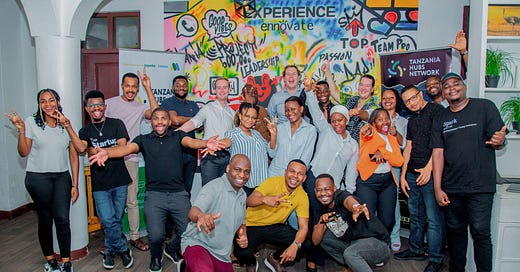1. Firm Shows New Way to Judge Borrowers Using Combined Data
A research team from Tanzania's Tausi Africa published their work on a new lending system in Springer's 2024 Future Technologies Conference proceedings. Their system, named Manka, looks at both bank statements and mobile money records to give financial institutions a complete picture of how people handle money.
According to the closed-access paper, which Atoms & Bits obtained, Manka:
Uses AI to check 300+ data points in financial records
Analyzes patterns like monthly turnover, number of active transaction days, and average spending
Groups borrowers into risk levels using advanced math (Principal Component Analysis)
Shows results through simple dashboards for both banks and borrowers
Updates scores automatically based on new transactions
How those features work in practice:
When someone applies for a loan, Manka checks their bank and mobile money history
The system analyzes spending patterns and payment behaviors
After three loan cycles, it builds a more detailed profile based on repayment history
Banks or microfinances can see risk levels through color-coded charts (low to high risk)
Borrowers get real-time access to their own scores through a dashboard
Derick Kazimoto (CEO), Dr. Said Baadel (R&D Director), and Davis David (Data Science & Machine Learning Head) were among the paper’s five authors. It appears in Volume 1 of the FTC 2024 proceedings (pages 67-76), among 172 papers selected from 476 submissions.
Manka’s approach aims to help African banks safely lend to people who are good at managing money but may not have traditional banking records. Tausi’s research earned a spot at the conference taking place November 14-15, 2024, in London.
2. Founder Leaves Digital Bookkeeping Startup After 4-Year Run
Founding CEO of the Tanzanian fintech Settlo has left the company after a four-year effort to help small businesses manage finances. Launched in 2020, the platform claimed to be the "#1 Business Record Keeping" solution in Tanzania, offering digital tools for transaction tracking and credit access.
The company:
Grew from 2 to 17 team members in under a year
Received TZS 75 million from UNDP’s Funguo Programme in early 2024
Selected among 17 winners from 800+ Funguo applicants
Participated in the PesaTech Accelerator's first cohort in 2023.
Reportedly secured venture capital last year
Key product features were:
Digital record keeping for small businesses
Payment processing system
Credit scoring for loan access
Multi-channel sales management
Business analytics dashboard
The departure comes as Tanzania's fintech sector sees increased competition. Bizzyn, a major competitor, continues offering a full suite of business tools, including accounting, inventory, payroll, and tax filing services, marketing itself as "the #1 cloud accounting and business management software" in Tanzania.
Settlo's founder, Mohammed Awami, noted the company "proved a concept and created a unique business model" despite operating in "one of the most difficult markets." He credited Sahara Ventures for early support and UNCDF Tanzania for technical and financial backing. Awami has since started a new venture called Elvt, though details remain under wraps.
Among other personal reasons we unfortunately could not verify, the leave reveals the complexities of Tanzania's SME fintech market, where customer acquisition costs and revenue per user remain key obstacles to profitability.
3. New VC Fund Launches
Ennovate Ventures, a Dar-based business development service provider, has launched TheNextFund, offering between TZS 53.2 million and TZS 266.1 million to post-revenue startups across East Africa. The fund aims to back companies it believes will become "category kings" in their markets.
Investment package details:
Up to $100,000 direct investment
Additional $150,000 available from partner investors
$5,000 in AWS credits for cloud infrastructure
Simba Money API access and market entry support
Sponsored trip to Cape Town for Africa's largest investor gathering
Core eligibility criteria:
At least 2 full-time founders or active management team
Verifiable revenue and business data
Local business registration in East Africa
Clear impact metrics and growth potential
Post-revenue status with proven market traction
The program structure:
12 months personalized venture-building support
Investment documentation prepared for investor network
Direct access to Africa's active venture capitalists
Technical assistance for high-growth companies
Dedicated global venture experts assigned to each startup
Selection involves a four-stage process: initial review, team interviews, committee evaluation, and final selection. Applications closed October 13, 2024, with winners like Swahilies (an SME payments platform) and LIMA (waste-to-feed/fertilizer) announced after a rigorous assessment focused on growth potential and team capability.
The Fund represents a new model of hands-on venture capital in East Africa, combining funding with deep operational support. Ennovate's approach suggests growing sophistication in the region's startup financing scene.
4. Bank Launches Zero-Cost Payment System for Merchants
The government-owned Tanzania Commercial Bank (TCB) Bank unveiled LIPA POPOTE, a new payment system that lets businesses accept money from any mobile money service or bank without paying fees. The system targets small businesses that often struggle with high transaction costs. But, sadly, it may mean that end users have to carry the fee burden (we'll check charges).
Key features:
Free transactions via Pay number or QR code
Works with all mobile money operators
Connects with any bank account
Instant payment confirmation
Real-time transaction tracking
Market context:
Current QR payment adoption is at 14% in Tanzania (FinScope 2023 reported 1%)
SMEs contribute over 30% to Tanzania's GDP
Growing demand for interoperable payment solutions
Rising need for cost-effective digital transactions
Focus on small business financial inclusion
The service aims to help Tanzania's small and medium businesses easily accept digital payments without the usual transaction fees. This comes as more Tanzanian enterprises move from cash to digital payments.
"We believe empowering SMEs and enabling cost-effective digital transactions will fuel economic growth," says Jesse Jackson, the Chief Digital & Innovation Officer at TCB Bank.
Lipa Popote provides an alternative to traditional mobile money merchant accounts where businesses face steep fees when transferring revenue or withdrawing their earnings from mobile money agents. It addresses a key pain point in Tanzania's digital payments ecosystem.
5. Can a Tech Toolkit Empower Tanzania's Small Businesses?
Tigo (HONORA) Tanzania launched Mjasiriamali Box 2.0 last week after revamping its enterprise solutions package after gathering feedback from their digital business customers. The upgrade targets small and medium enterprises (SMEs) with an integrated suite of digital tools.
Package includes:
Minimum of 5 business SIM cards
5G router with internet bandwidth
Dedicated business phone line
Bulk SMS capability
Digital payment number (LKS)
Business loan access
Financial management platform
Online self-service portal
Key improvements from version 1:
Added 5G internet capabilities
Integrated financial management tools
Expanded digital payment options
Enhanced self-service features
Streamlined loan application process
According to Chief Business Officer John Sicilima, this upgrade responds directly to customer feedback. The package aims to help Tanzania's small businesses manage communications, payments, and finances through a single platform.
Businesses can access the new service through Tigo's online portal, with the company focusing on digitizing operations for street vendors, bus conductors, repair shops, and small retail stores across Tanzania.
6. Electric Train Adds Features for Special Needs Users
Tanzania's Electric Multiple Unit (EMU) train service has rolled out new accessibility features, making it the country's first mass transit system designed specifically for passengers with disabilities.
Key accessibility features:
Low-floor design for easy boarding
Dedicated spaces for wheelchair users
Visual display systems
Audio announcements
Emergency assistance protocols
Trained staff for special assistance
Infrastructure improvements:
Minimized platform gaps
Designated waiting areas
Clear signage systems
Emergency evacuation routes
Accessible ticketing systems
This government-led initiative is an important shift in public transportation design. The features aim to make independent travel possible for previously underserved commuters.
The project aligns with:
UN Convention on Rights of Persons with Disabilities
Tanzania's public transport modernization
National disability inclusion policies
Urban mobility improvement plans
The EMU service sets a new standard for accessible public transport in East Africa, potentially influencing future transport projects across the region. Training programs for conductors and staff emphasize proper assistance techniques and disability awareness.
7. MUHAS Explores AI in Healthcare
The Muhimbili University of Health Sciences (MUHAS) showcased emerging health technologies at its Digital Health & Innovation Week 2024. The event, among other highlights, featured discussions on using artificial intelligence and digital systems to strengthen Tanzania’s healthcare sector
A panel of experts including Dr. Deogratius Mzurikwao (MUHAS), Dr. Irene Mremi (NIMR), and Eng. Andrew Kajeguka (EAC) explored how AI can improve health monitoring. They focused on developing predictive models for outbreak forecasting and improving disease detection through better surveillance systems.
The event coincided with MUHAS securing a 6-year research agreement with the Swedish government through Sida, partnering with Karolinska Institute. This TZS 12.5 billion collaboration aims to strengthen the university's research capabilities in digital health solutions.
8. All-in-One POS Terminal Now Available
Selcom Tanzania introduced QwikChap, a new point-of-sale (POS) device combining multiple payment services in one terminal. The system costs TZS 200,000 and includes float money for merchants starting out.
The device addresses common merchant challenges. It:
Eliminates need for multiple payment machines
Handles all types of digital transactions
Reduces counter space requirements
Lowers total equipment costs
Simplifies payment management
Marketed as "Mashine moja, huduma zote" (one machine, all services), QwikChap targets small businesses and agents looking to streamline payment operations. Merchants get toll-free support through Selcom's 0800 784 888 helpline.
The launch comes as Tanzania's payment scene grows more complex, with businesses often juggling multiple devices for different payment types. Selcom's integrated approach suggests a shift toward unified payment solutions that work for small merchants.
QwikChap offers merchants an affordable entry point into electronic transactions while simplifying their operations.
9. Starlink Moves Closer to Tanzania Launch
The Tanzania Communications Regulatory Authority (TCRA) has opened a 14-day public comment period for Starlink's license application. This follows Starlink's resolution of earlier (2023) government concerns about spectrum rights and data privacy compliance.
Starlink's potential pricing puts it in Tanzania's premium internet segment:
Monthly fee: TZS 257,000
Hardware cost: TZS 1.4 million
Current satellite internet providers charge less:
Konnect: TZS 60,000 monthly + TZS 345,000 for equipment
Blink: TZS 30,000 monthly + TZS 200,000 for equipment
The Electronic and Postal Communications Act requires TCRA to publish license applications and collect public input over 14 days, except for licenses shorter than five years.
"The delay in Starlink's presence had been attributed to concerns over spectrum rights and compliance with data privacy laws," notes technology lawyer Pascal Livin Mshana. "It now seems these legal requirements have been met."
Starlink targets affluent households, businesses, and organizations rather than competing for mass-market customers. The service aims to fill gaps in areas where fiber and mobile broadband struggle with reliability or aren't available.
The licensing progress indicates Tanzania's growing openness to international satellite internet providers, though with clear requirements around data protection and spectrum usage.
10. UNDP Unveils New Startup Support Program
FUNGUO has created the #YouthIgnite Student Founders Fellowship to support university entrepreneurs. The program comes as 1.2 million young Tanzanians enter the job market annually, with formal employment meeting only a fraction of demand.
The fellowship works through two channels:
Direct support to student-led businesses with seed funding
Technical support to university innovation hub managers
Ten university innovation hubs joined the first Hub Managers Workshop on October 31, run by StartHub Africa and Westerwelle Startup Haus Arusha. The workshop focused on practical skills for supporting student entrepreneurs.
At Buni Hub, FUNGUO and COSTECH selected 10 women-led tech projects through the Future FemTech Program. These founders receive mentorship and funding to develop prototypes and pitch to investors.
The program also led 15 innovation hubs (from the recently launched Tanzania Hubs Network—THN) to Cape Town's AfriLabs Annual Gathering from November 6-8. The delegation organized a side event focused on national hub networks and local ecosystem development.
Program Funding Sources:
European Union (BEGIN Programme)
British Government (Africa Technology and Innovation Partnerships)
UNDP Tanzania
United Nations Capital Development Fund
FUNGUO operates alongside COSTECH and other government agencies. Its support targets both new startups and existing small businesses, focusing on job creation for women and youth.





Good work, keep pushing I see something like Techcrunch for Africa